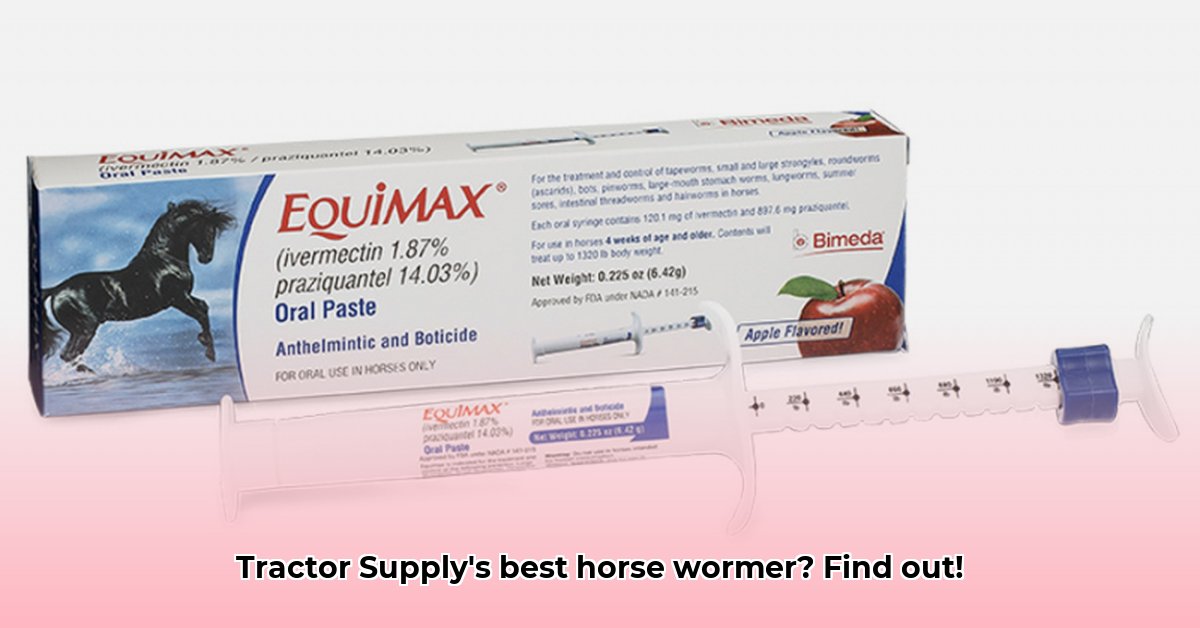
Understanding Sustainable Deworming Practices
Keeping your horse healthy involves managing internal parasites effectively. This guide provides actionable steps for sustainable deworming, focusing on minimizing medication use while maximizing your horse's well-being and protecting the environment. Traditional deworming practices, often relying heavily on Ivermectin, are now facing challenges due to increasing parasite resistance and environmental concerns. This guide offers a more responsible and effective approach. For more information on deworming products, check out the Tractor Supply weekly ad.
The Challenges of Traditional Deworming Methods
For years, Ivermectin (a common dewormer) was the go-to solution for parasite control. However, overuse has led to widespread parasite resistance, diminishing Ivermectin's effectiveness. Moreover, frequent use of chemical dewormers has negative environmental consequences, with residues potentially accumulating in soil and water. This necessitates a shift towards more sustainable practices. Isn't it crucial to find a balance between horse health and environmental responsibility?
Smart Deworming: A Targeted Approach
Sustainable deworming hinges on a targeted approach, prioritizing testing before treatment. A fecal egg count (FEC) test, performed by your veterinarian, determines the actual parasite burden in your horse. Deworming is only necessary when the test reveals a significant parasite load. This dramatically reduces medication use, minimizing environmental impact and slowing resistance development. Think of it as precision medicine for your horse, using the right tool for the job and nothing more.
Choosing the Right Dewormer at Tractor Supply
Tractor Supply offers various deworming products. However, before purchasing any product, consult your veterinarian. They can assess your horse's health history and current needs, recommending the most appropriate dewormer and dosage. This personalized approach is far safer and more effective than selecting a product without veterinary guidance. Always adhere strictly to the product label instructions.
Sustainable Deworming Strategies: A Holistic Approach
Sustainable deworming is more than just selecting a wormer; it's a comprehensive strategy encompassing several key elements:
Regular Fecal Egg Counts (FECs): Routine FEC testing (think of it as your horse's annual parasite checkup) guides your deworming decisions, ensuring treatment only when necessary.
Strategic Deworming: Treat only when FEC results indicate a substantial parasite load. This dramatically reduces medication overuse, minimizing the risk of resistance.
Rotational Grazing: Rotating horses between pastures reduces parasite concentration in any single area, giving the land time to recover and reducing parasite transmission.
Pasture Management: Maintain clean pastures. Regular manure removal significantly decreases worm egg numbers in the environment.
Exploring Alternatives (With Veterinary Guidance): While research is still ongoing, some horse owners, under strict veterinary supervision, explore complementary methods such as botanicals. Always consult your veterinarian before implementing alternative approaches.
Ivermectin: Weighing the Benefits and Drawbacks
Ivermectin remains a widely available and effective dewormer, commonly found at Tractor Supply. However, it's crucial to acknowledge the limitations:
| Feature | Pros | Cons |
|---|---|---|
| Effectiveness | Broad-spectrum efficacy against various parasites. | Growing parasite resistance diminishes its long-term effectiveness. |
| Cost | Relatively inexpensive. | Overuse can lead to wasted resources and accelerate resistance development. |
| Environmental Impact | Relatively low compared to some alternatives. | Overuse can contribute to environmental contamination. |
A Sustainable Future: A Healthy Horse and a Healthy Planet
Sustainable deworming is a long-term commitment to both your horse's well-being and environmental protection. By collaborating with your veterinarian, using FEC tests to guide decisions, and incorporating optimal pasture management, you're building a more responsible and effective deworming strategy. Remember, continuous learning and staying informed about the latest research are crucial for adapting to evolving deworming challenges.
How to Reduce Ivermectin Use in Horses Sustainably
The overuse of Ivermectin necessitates a shift towards sustainable deworming practices. This involves a multi-faceted approach, focusing on targeted treatment and responsible pasture management. It’s not about completely eliminating Ivermectin but rather minimizing its use responsibly.
Strategic Deworming Guided by FECs: Rely on FEC results to determine the necessity of deworming for each horse. This avoids unnecessary treatment and slows resistance development.
Targeted Treatment: Treat only horses with high parasite loads as identified by FEC tests.
Effective Pasture Management: Implement rotational grazing and regular manure removal to minimize parasite build-up in the environment.
Alternative Anthelmintics (with Veterinarian Consultation): Explore alternative dewormers under veterinary guidance to break the reliance on Ivermectin and prevent resistance.
Natural parasite control Methods: Consider natural methods such as improving pasture hygiene and stall cleaning to supplement medical interventions. Consult your vet to ensure efficacy and safety.
Regular Veterinary Check-Ups: Regular veterinary visits are crucial for monitoring your horse's overall health and tailoring deworming strategies to individual needs.
Key Takeaways:
- Strategic deworming based on FEC results is fundamental.
- Targeted treatment significantly reduces total medication usage.
- Pasture management plays a crucial role in parasite control.
- Rotating anthelmintics prevents the development of resistance.
- Regular veterinary care is essential for personalized deworming plans.
Remember, sustainable deworming is a long-term commitment to your horse's health and environmental responsibility. Always consult your veterinarian for personalized advice and guidance tailored to your specific situation.